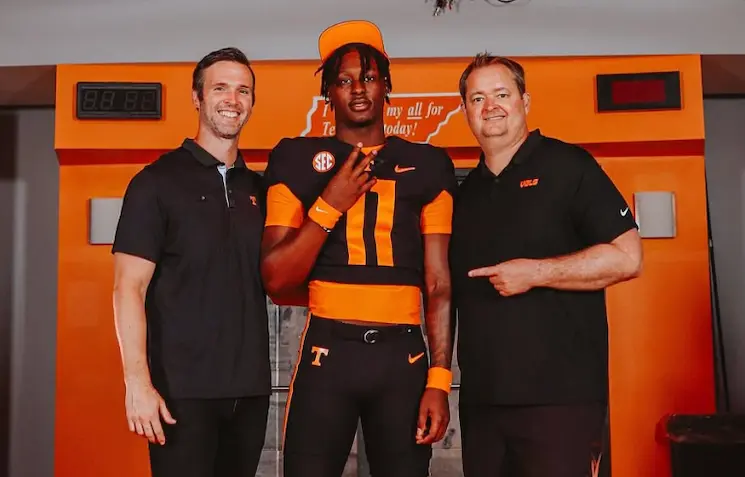
There have been many reasons why Tennessee’s football program has failed to meet expectations over the last few years. Whether it’s been poor coaching, poor play calling, or bad recruiting evaluations, the Vols have fallen prey to a number of maladies. But over the last couple seasons, two of the biggest issues with Tennessee football has been their strength and conditioning program and developing their talented players.
In the 2016 and 2017 seasons, the Vols suffered an inordinate amount of injuries. Tennessee lost a large amount of players to injury in 2016, and last year saw the offensive line and quarterback position get decimated thanks to injuries. Not all of those were because of poor conditioning, but others were a direct result of things done (or not done) in the weight room.
Those injuries would hurt any team. But the Vols’ coaching staff under Butch Jones had a problem with developing players consistently across the board, and that caused an issue with developing quality depth. So when starters would get hurt, there would be a large drop-off in quality of play from their backups.
It wasn’t always this way at Tennessee, though. When the Vols were at their peak in the 1990s and early 2000s, UT’s strength and conditioning program was one of the top in the country. And one of the players who donned the orange and white during that period believes that if Tennessee is ever going to get back to where they once were, they need to make conditioning a priority again.
Jabari Davis was a running back for the Vols from 2001-04. During his time with Tennessee, the Vols won two SEC East titles and won 39 of their 52 games during that span. Tennessee’s overall health and depth played a large part in that success.
And Davis wants to see the Vols get back to that.
“I want to see us stay healthy,” Davis said during an autograph event at Toyota Knoxville. “I want to see us go through October and November and we got all of the guys we can depend on healthy. Because you saw last year we struggled health wise. Everybody was getting hurt. It’s hard to compete against the Georgias and Floridas and go through October when you don’t have all your play-makers.
“If we can stay healthy, consistent, and get hot at the right time, I think we’ll beat one or two people we’re not supposed to beat based on quality coaching.”
New head coach Jeremy Pruitt has already tried to make big changes to UT’s strength and conditioning program. He hired Craig Fitzgerald away from the Houston Texans to head up the Vols’ program, and UT just underwent a renovation to their weight room that cost over $600,000 total.
And Davis likes what he’s seen from the new strength and conditioning program so far.
“I told all the guys the other day that when I was in the weight room a few weeks ago and saw the guys coming out lifting weights, it reminded me of when we had Johnny Long as our strength coach,” Davis stated. “I mean, they were really in there getting after it. They were sweating and could barely walk or talk.”
Long was promoted to UT’s strength and conditioning coordinator in 2002 after John Stuckey retired. Long’s teams didn’t miss a beat after he took over for Stuckey, and the Vols were still one of the toughest and best conditioned teams in the SEC with Long.
But success goes beyond just the weight room. Coaches need to develop players on the field too, and they need to focus on more than just the starters. Quality depth helps ramp up competition and can help win championships. Just ask Alabama.
Cedric Houston played running back for Tennessee during the same span as Davis. And he experienced firsthand how quality depth made him and the rest of the team better.
“When I played, it was next man up,” Houston added. “If I got hurt, we had (Gerald) Riggs, (Arian) Foster, and (Montario) Hardesty right there waiting. We got to have it where it’s back like that.”
All three of the backs Houston mentioned ended up having 1,000-yard seasons with Tennessee, and Houston did also. In 2004, both Houston and Riggs ran for over 1,000 yards. Foster ran for over 1,000 yards in 2007, and Hardesty ran for over 1,000 yards in 2009.
In fact, three of those four running backs are still in the top 10 in program history for most rushing yards in a career. Foster is second all-time with 2,964 yards, Houston is seventh with 2,634 yards, and Hardesty is ninth with 2,391 yards.
The Vols haven’t had that kind of depth at any position in recent years. And that’s all because of poor conditioning and poor development.
“I think we need to do a great job of developing players,” Houston added. “I’ve seen a lot of classes come in with four and five-star guys, and you look up at these guys four or five years later and they’re not developed how you want them to be developed.”
Tennessee still has a number of those four and five-star players on their roster in Pruitt’s first year at the helm. And Vol fans are hoping he and his staff can get much more out of them than UT’s previous coaching regime.



